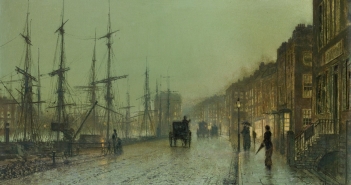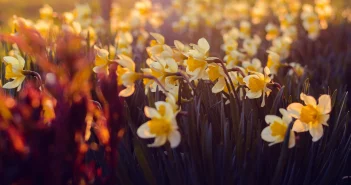Inside the castle’s gift shop stood White, reading the biography of the artist whose work was on exhibit. She was not a local. White had expected as much. It was often the case. Arts councils promote the work of foreign writers and artists, liminal beings that they are.
Yes, I mean, why else would they have done it? Artists are, after all, liminal beings forever inhabiting society’s margins, and that is why so many among their number are consigned to travel abroad. Even on foreign shores their natural domain is to live out on the perimeter. So to be permanently precarious, is in a sense, an ontological grounding for them, of sorts.
The work on display was surprising and novel, he thought. Artistic tropes were being explored in both complex and perhaps popular ways. A Bacchic display of human like heads whose hair had been transformed into great tresses of grapes at once reminded him of those chiseled river gods which adorned so many public buildings and bridges in the inner city, or humorous reworkings of the once risqué Sheela na gig, now easily hung on the walls of someone’s room. But whose?
No, there was something not quite right there. White considered the surrounding geography, the demographics of the local populace. What used to be thought of as middle class couples; a dying breed that were the glue cementing a working class on one end to the rich on another.
How were they immediately indentifiable, the middle class? Typically, two cars. The drive- way foregoing any semblance of lawn or front garden as now the mortgage payments to maintain a three-bedroom plaster board edifice made it imperative that both parents work. Which meant two cars despite one’s carbon footprint on the environment. What an utter sham, and it had happened almost overnight. The newspapers had just announced an average cost now for these three-bedroom abodes was over half a million euros.
White couldn’t afford one and he was convinced that this was one of the reasons why his father had only ever stepped foot in his place once during the last decade, out of shame. Although, unless pressed on a drunken night, he would never dare admit to it.
Appearances were everything. Post-colonial societies were a bloody nightmare. The REP was no different. REP was White’s name for The Republic of Ireland, which was such a fucking mouthful, that if you uttered the phrase it was as if your mouth was overflowing with snot and phlegm.
The elderly woman behind the gift shop’s small counter remained on the phone. White hung about now just trying to get a bit of information on the whereabouts of a local writer’s group he had once been a part of, so many years ago. Well, being a part of was perhaps too strong a word for it. White had long since ceased being a joiner. He was the most liminal of them all.
A stroll might reveal if there was any indication at all of the existence of the writer’s group to be found in the shop. He had already checked the walls in the hall leading into the café but to no avail. Then, hovering by the counter, he noticed a few paperbacks placed on a corner table by an entrance leading into the castle itself. Sure enough, he found what he had been looking for. Two titles were by members of the writers group. One was a local who had been a tradesman all his life in the inner city who upon retirement had moved out to Sker to settle down in a three-bedroom house built in the nineties. An older housing estate to the one where White lived.
John Freed was the man’s name. White had met him about a decade ago when attending the writer’s group one Saturday morning. John was almost mono-syllabic at the time, but that was what was attractive about him back then. Now, emboldened by so many open mic sessions, and with the latest coup of finally getting a book out, John had left behind his former persona filled with quiet reticence and smouldering frustration, a rather charming cocktail White had thought, only to replace the former qualities with a newfound confidence and stupidity that filled White with despair.
What is it about society these days? he thought. Everyone’s a poet or an artist. You would see it on their LinkedIn accounts; Profession: Poet at Writer. How many poets actually made a living from writing poetry? With six published collections behind him, White wouldn’t put Poet as his profession. In thirty years of writing, he had earned about six thousand euros. In all that time.
White felt the furies coming on, so he made for the door of the gift shop and got the fuck out. Far as he could away from that place. Anything might set him off.
On the way, he would message John and ask him about the possibility of a gig. He was going up to the castle on a regular basis now, particularly as he was using the rose garden in the castle grounds as a centre-piece, in a sense, to the new novel that he was working on. So, it made perfect sense to reach out and enquire about facilitating a reading or a workshop of some kind. Readings and workshops! Hardly were the words out of his mouth and he was again driven to the depths of despair. Christ, but what a god-awful fucking society they had become!
Looking downhill on the whole surrounding territory before him, White sent a brief message to Freed enquiring about the possibility of a reading followed by a workshop or something and a nominal fee of fifty euro or so. Should he invite Freed out for a drink down in the bill local where they both used to read together? White liked Freed, as a person. He simply hated what he had become and this was more a societal thing as Freed was just caught up in it all.
White’s iPhone addiction was getting to the point that he would find himself either reading texts or making audio messages while he was out in the middle of one of his hikes. But now he stopped on the pathway that interrupted the flow of the descent. The view was simply overwhelming if you actually took the time to take it in.
His surroundings went back to the mid-seventeenth century. A main house and an estate which had been cleared of woodland. But the castle itself had really only come into its own at the beginning of the eighteenth century and then was further developed in the early 19th. It was easy to imagine, White reflected, looking around him at the great expanse of sea before him. The little harbour floating illusory upon the waves of sometime mercury only to be replaced by emeralds and aquamarine when the sunlight danced upon it. Sker’s own micro-climate could be summer-like which White was experiencing just now, only for the skies to suddenly cloud, and he would beat a retreat back into the woods from whence he came.
Yes, it was very easy to think back to the early 19th century, the time of Jane Austen and Napoleon. Or Ludwig van Beethoven, who White once listened to for years on an old Walkman. Until that ancient machine finally gave up the ghost. It had been a kind of statement. His stubborn refusal to use Spotify. Somehow, playing compact discs, which he carried around in a special satchel, allowed him to keep connected to the eighties and nineties, to a mythical past when he had attained his apex.
Now, most certainly, he was in the grips of irreversible decline, which was fine. One could not reverse the inevitable. That would be folly. Acceptance then? Nay! Embrace, rather. One had to embrace one’s age. One’s own and also that age into which one was born.
Besides, White thought, it had all really started, his decline, in his early thirties. That had been the start of it. Age thirty-three to be precise. The age of Christ! What a fucking joke. It was too rich really, but then, life had always been surprising and rich in irony. White recommenced his walk. The slow decent of the hill sped him gently on his way. Freed had responded by a thumbs up. Detestable habit. What a cunt, White thought, laughing to himself through the almost audible strains of the Eroica booming again in his ears.




